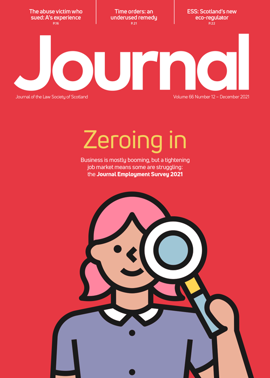Family mediation accreditation: a view from the panel
There are currently 76 family law mediators accredited by the Law Society of Scotland. Accreditation is for three years (shorter than the five year period for most specialist accreditations), after which an application for renewal is required if the applicant wishes to continue to practise.
The Family Mediation Accreditation Panel, which at present has six members, considers all new applications for accreditation and for renewal of accreditation. The members of the panel, most of whom are themselves practising family mediators, are acutely aware that among the many challenges faced by practitioners over the last couple of years has been maintaining professional accreditations and meeting training requirements. While the primary responsibility of the panel is to ensure the maintenance of standards, the approach to regulation has always been “light touch”, and the panel considers it has a responsibility to carry out its duties in a way that advances the availability of mediation as an alternative method of dispute resolution.
In an effort to help applicants ensure that they provide the panel with the information needed to assess their application and to avoid unnecessary delay while further information is requested, the panel has recently redesigned the accreditation application form.
The most common issue arising with applications has been failure to provide sufficient information to allow the panel to be satisfied that the training/CPD requirements are met.
An attempt has therefore been made to focus the new form on the key requirements which must be met to allow the panel to approve an application.
For a first application, the requirements are:
- completion, within the last three years, of a foundation mediation training course lasting more than 30 hours, and a report from the mediation trainer who observed the applicant in role plays during training.
For a renewal application, the requirements are:
- that in each year of accreditation the applicant must have undertaken no less than 15 hours of continuing professional development, which must include a minimum of six hours’ mediation training and a minimum of five hours’ family law black letter law training (of which two hours require to be on financial provision);
- completion of one peer review in co-mediation in each year of accreditation;
- an assessment of competence report prepared by an approved assessor.
The new application form is designed to ensure that the necessary information cannot easily be omitted in error, and will hopefully assist applicants in ensuring that their applications are granted swiftly and without the need to respond to requests for further information.
The panel recognises that there will sometimes be extenuating circumstances which mean an applicant is not able to fulfil all of the requirements for accreditation or, more likely, renewal. When this happens, the panel is often able to agree with the applicant a basis on which the application can nonetheless be granted, for example by means of an undertaking that any missed training will be made up during the next period of accreditation.
The panel would welcome feedback from applicants on any aspects of the application process which it is felt could be improved.
The Society is authorised to accredit family mediators under the Civil Evidence (Family Mediation) (Scotland) Act 1995. If you are a practising solicitor interested in being accredited as a mediator and wish to find out more, please contact the team at specialistaccreditation@lawscot.org.uk
Regulars
Perspectives
Features
Briefings
- Criminal court: OLRS – life means life
- Corporate: Will a deal impact on national security?
- Intellectual property: IP and AI – the latest
- Agriculture: Securing successor crofting tenant status
- Succession: Back of an envelope – testamentary intent?
- Scottish Solicitors' Discipline Tribunal
- Data protection: Google off the hook
- Property: Beautifully presented tedium
- In-house: Lawyers in uniform
In practice
- Your Law Society of Scotland Council members
- Legal services regulation reform – have your say
- The Word of Gold: Whither goest thou?
- Coaching: help in a fast changing world
- The earlier the better
- Family mediation accreditation: a view from the panel
- The Eternal Optimist: Just to say thanks…
- Appreciation: Albert Vincent Sheehan
- Ask Ash: A broken work circle






